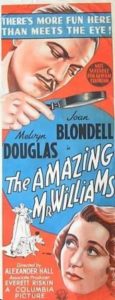1939 is often lauded as Hollywood’s greatest year, and in a year highlighted by such films as Gone with the Wind, The Wizard of Oz, Stagecoach and Mr. Smith Goes to Washington, it is not surprising that a rather smallish film like The Amazing Mr. Williams escapes attention.
One of three films that stars Joan Blondell and Melvyn Douglas made at Columbia Pictures from 1938-39, The Amazing Mr. Williams has the feel of a picture which was intended to be the start of a series along the lines of The Thin Man and the dynamic of Nick and Nora Charles. Though Blondell and Douglas do work well onscreen (though perhaps not as well as another frequent costar, Warren William), the hoped for series never materialized.
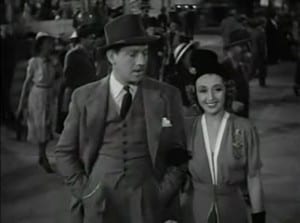 Here Douglas is Kenny, a police detective who is engaged to Maxine (Blondell). They bicker playfully but it is clear from the start that Kenny is devoted to his job, dropping out of dates and other engagements with Maxine at the drop of a hat. Perhaps because of this preoccupation with his work, Maxine doesn’t want to marry Kenny until he is off the force and working elsewhere.
Here Douglas is Kenny, a police detective who is engaged to Maxine (Blondell). They bicker playfully but it is clear from the start that Kenny is devoted to his job, dropping out of dates and other engagements with Maxine at the drop of a hat. Perhaps because of this preoccupation with his work, Maxine doesn’t want to marry Kenny until he is off the force and working elsewhere.
Complicating matters is Kenny’s superior at the department, Captain McGovern (played by Clarence Kolb). McGovern seems to be a gruff taskmaster with a flair for ‘poking the bear,’ as he continually sends Kenny on special assignments to keep him away from Maxine, knowing full well of her desire for him to leave the force as a prerequisite for marrying him.
Over the course of the film this takes various- and sometimes rather outlandish- avenues, the most ludicrous of which has Kenny dressing as a woman to serve as a decoy to cash a chronic mugger. Let’s just say it isn’t a pretty picture, but shaving his mustache might have been helpful as the veil he wears draws even more attention to himself.
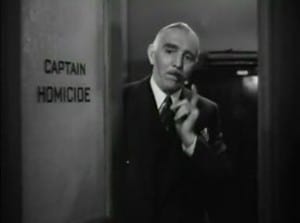 As the slapstick quotient increases Kenny leaves the force a few times, only to jilt Maxine yet again- at one point not even showing up for their wedding at city hall, where Maxine is employed. Finally in another caper, Kenny goes rogue and sets off to exonerate a wrongly accused safecracker. With the force against him now as well, Maxine finds herself torn before finally deciding to help Kenny, whatever the cost.
As the slapstick quotient increases Kenny leaves the force a few times, only to jilt Maxine yet again- at one point not even showing up for their wedding at city hall, where Maxine is employed. Finally in another caper, Kenny goes rogue and sets off to exonerate a wrongly accused safecracker. With the force against him now as well, Maxine finds herself torn before finally deciding to help Kenny, whatever the cost.
Of course the rub is that by helping Kenny get the bad guy, Maxine develops her own love of law enforcement. Finally married and about to start their honeymoon, a few of Kenny’s fellow officers stage a prank calling her to the precinct.
Though The Amazing Mr. Williams is an entertaining picture, if there is a negative it is that the police angle is leveraged perhaps too much. Perhaps if the series would have continued the added time on office gossip would have been beneficial, but in the setting of a single film it tends to bog down the proceedings.
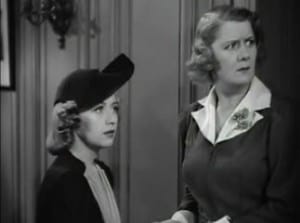 One of the highlights, even of a sluggish middle third which on the two leads and their lives apart (Maxine with her coworker Effie at city hall and Kenny and the police), is two strong supporting character actors in the forms of Clarence Kolb and Ruth Donnelly as Captain McGovern and Effie, respectively.
One of the highlights, even of a sluggish middle third which on the two leads and their lives apart (Maxine with her coworker Effie at city hall and Kenny and the police), is two strong supporting character actors in the forms of Clarence Kolb and Ruth Donnelly as Captain McGovern and Effie, respectively.
Kolb, who always seemed to have an affinity for vaudeville (from whence he came) and playing stern politicians, is impishly delightful in causing Kenny’s (and later Maxine’s) torment. It is also nice to see Ruth Donnelly (as Effie) get some significant screen time in one of her rare excursions from the Warner’s back lot.
The highlight of the film as expected is the two stars, Melvyn Douglas and Joan Blondell. Douglas is predictably smarmy and yet childishly manic all at the same time. He plays well against Blondell’s playful nagging. It’s hard to take her imagined petulance overly seriously, as she always seems on the verge of cracking a smile or laughing at Kenny’s indecisive nature.
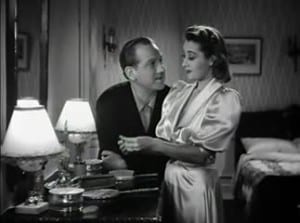 Presumably the desired series never materialized not because of anything to do with Douglas or Blondell, but rather something more basic. Every studio of the time was seeking their own version of Nick and Nora Charles and perhaps Maxine and Kenny just weren’t up to par.
Presumably the desired series never materialized not because of anything to do with Douglas or Blondell, but rather something more basic. Every studio of the time was seeking their own version of Nick and Nora Charles and perhaps Maxine and Kenny just weren’t up to par.
The other reason that we didn’t see this dynamic duo may be simply that the material they were given wasn’t that strong. Though none of the interplay reaches truly abysmal depths, rarely does it strike any new ground either. The one running joke throughout- the tug of war between Maxine’s desire for Kenny’s undivided attention and Kenny’s love of police work- becomes tired and strained at a surprisingly early point in the film.
Though mildly amusing, Kenny’s ‘drag episode’ comes very early on in the film and come across badly on many levels. Not only is it almost impossible to imagine anyone (even in dim lighting while squinting) to mistake Douglas for a woman for an instant, but there is also little imagination involved. It’s an easy joke readily grabbed for, but perhaps is indicative of a greater lack of fresh creative ideas funneling into The Amazing Mr. Williams.
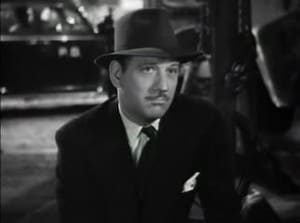 Perhaps a greater problem brought on isn’t that this old ploy is incorporated, but rather that it is laid out so early. Though perhaps it would have been challenging to incorporate into the storyline later on, it lowers audience expectations and never manages to raise them again.
Perhaps a greater problem brought on isn’t that this old ploy is incorporated, but rather that it is laid out so early. Though perhaps it would have been challenging to incorporate into the storyline later on, it lowers audience expectations and never manages to raise them again.
In a year where there was so much creativity and where the filmed art reached what may well be its high water point, Mr. Williams gets overwhelmed by its own mediocrity. In another year, one without such heady competition, perhaps the film could have launched a successful series. In 1939 it didn’t stand much of a chance.
